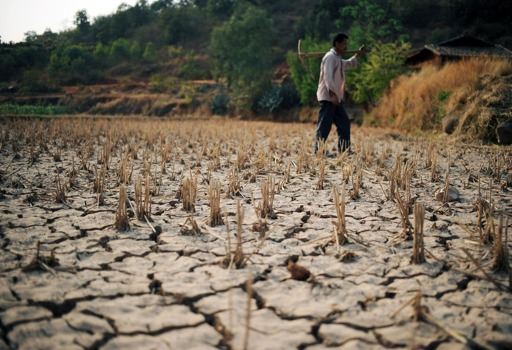- cross-posted to:
- [email protected]
- cross-posted to:
- [email protected]
Oh, we see it coming. Maybe those on the forbes list dont give a shit.
Yeah, it’s been, with the coming water wars, one of the main concerns for the last few decades.
yeah its funny when things are like. no one who is unable to do anything about it is doing anything about it.
For me, this is one of the most terrifying tipping points we rarely talk about. Once food gets scarce for real, we are so fucked.
Or water. My hope is that renewables and water reclamation, like desalination start to cancel out. Then we survive as a species. Otherwise, mass deaths. We just don’t know where yet.
“We’re losing 120 calories per person, per day, for every degree of global warming.”
That is just 0,006% of 2000kcal per degree? Doesn’t sound like that much tbh.
Edit: the publication in nature contains different information:
We estimate that global production declines 5.5 × 1014 kcal annually per 1 °C global mean surface temperature (GMST) rise (120 kcal per person per day or 4.4% of recommended consumption per 1 °C; P < 0.001).
I believe you shifted the decimal place. You should have 6%, not 0.006%
6% per degree of warming, and it could be 3 or 4 degrees or whatever…I believe they used 3.5° and a total damage of ~20% as one of the projections for the end of the century.
They also call for significant losses to production by 2050.
They were actually right. Whoever transcribed that quote didn’t get the correct Calorie. Not to blame them.
Americans use calorie for the SI kcal. Allergic to metric prefixes.
Assholes never seem to miss an opportunity to shoehorn their pet project into every fuckdamn conversation…
Hey asshole, people live within the context of their own lives, not yours. I have no fucking pet project, I’m an American, this is an American publication, someone in the comments got the math wrong because they were using SI calorie for the colloquial American term for kilocalorie (or at least, that would explain a three digit shift easily).
Don’t insult me just because you didn’t understand. Get clarification, you fuck.
Americans use Calorie for kcal.
It’s capitalized.
Yeah, legally. But not colloquially. This is a colloquial publication (Forbes). They used calorie knowing Americans would know it as a Calorie or kcal
Nature paper is here: https://www.nature.com/articles/s41586-025-09085-w
We estimate that global production declines 5.5 × 1014 kcal annually per 1 °C global mean surface temperature (GMST) rise (120 kcal per person per day or 4.4% of recommended consumption per 1 °C; P < 0.001).
It’s a pretty weird and interesting paper. The big idea is that we will have to majorly revamp the agriculture practices to adapt to climate and weather. The climate and the weather would have extreme amounts of damage taken against how we produce food right now. What this paper argues is that we can mitigate some of these losses in many places, and that by shifting what we grow and where we grow it, we can still make farming work to a lesser extent than today…the paper attempts to model what the net future potential would be for a more resilient state.
Anyhow, there will be less food produced even after we adapt.
What this paper argues is that we can mitigate some of these losses in many places, and that by shifting what we grow and where we grow it, we can still make farming work to a lesser extent than today
I think this is why Trump wants Canada and Greenland, btw.
That would imply Trump gives a shit about food security or anybody else. He wants those because he would like to be known for adding to homeland territory like all his favourite dictators.
I think this is why Trump wants Canada and Greenland, btw.
You’re a fucking idiot sop sanewashing a demented authoritarian
Without fossil fuels natural bioproductivity of the planet allows for 500 million individuals sustainably, probably a bit less. So some 95% of the population will succumb to excess deaths. The only question is, how soon.
Just want to point out: So, exactly how many things in the last 30 year involving a major revamping of anything that also didn’t ridiculously profit the financial elite actually get enacted?
None you say?
Hmmm… what makes you think this will be any different?
No one in power cares what the scientists or economists say anymore



